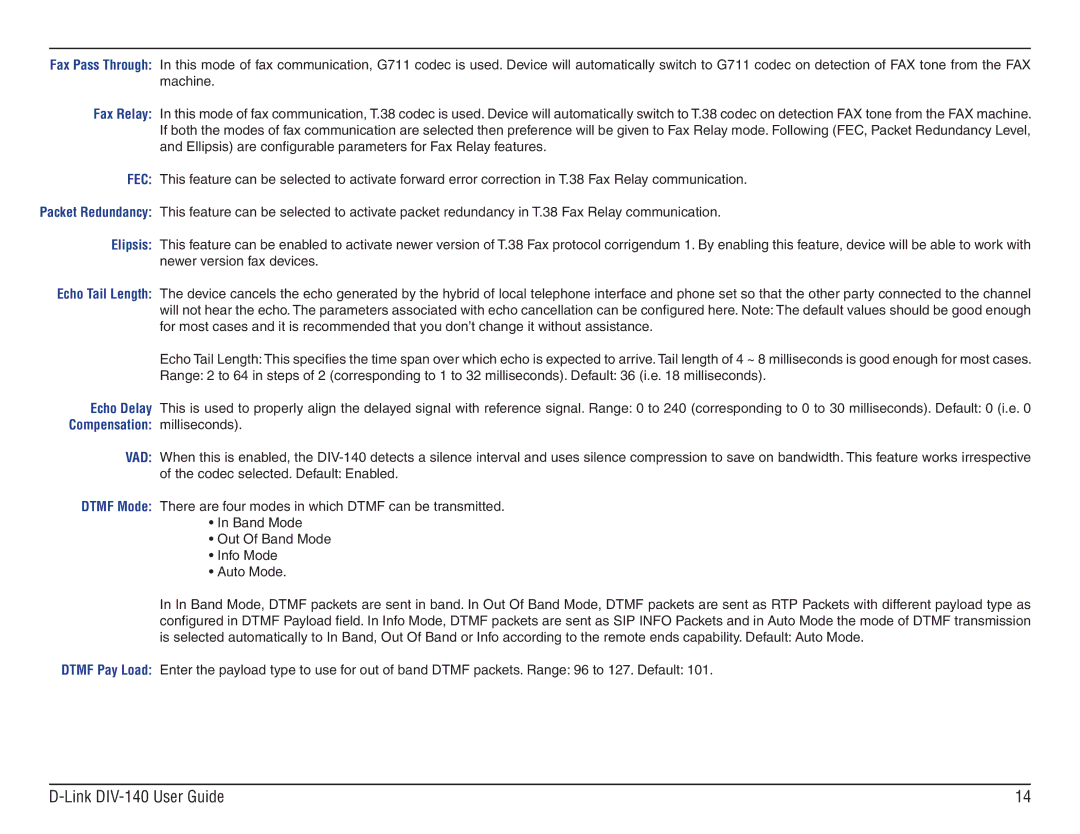Fax Pass Through: In this mode of fax communication, G711 codec is used. Device will automatically switch to G711 codec on detection of FAX tone from the FAX machine.
Fax Relay: In this mode of fax communication, T.38 codec is used. Device will automatically switch to T.38 codec on detection FAX tone from the FAX machine. If both the modes of fax communication are selected then preference will be given to Fax Relay mode. Following (FEC, Packet Redundancy Level, and Ellipsis) are configurable parameters for Fax Relay features.
FEC: This feature can be selected to activate forward error correction in T.38 Fax Relay communication.
Packet Redundancy: This feature can be selected to activate packet redundancy in T.38 Fax Relay communication.
Elipsis: This feature can be enabled to activate newer version of T.38 Fax protocol corrigendum 1. By enabling this feature, device will be able to work with newer version fax devices.
Echo Tail Length: The device cancels the echo generated by the hybrid of local telephone interface and phone set so that the other party connected to the channel will not hear the echo. The parameters associated with echo cancellation can be configured here. Note: The default values should be good enough for most cases and it is recommended that you don’t change it without assistance.
Echo Tail Length: This specifies the time span over which echo is expected to arrive. Tail length of 4 ~ 8 milliseconds is good enough for most cases.
Range: 2 to 64 in steps of 2 (corresponding to 1 to 32 milliseconds). Default: 36 (i.e. 18 milliseconds).
Echo Delay This is used to properly align the delayed signal with reference signal. Range: 0 to 240 (corresponding to 0 to 30 milliseconds). Default: 0 (i.e. 0 Compensation: milliseconds).
VAD: When this is enabled, the
DTMF Mode: There are four modes in which DTMF can be transmitted.
•In Band Mode
•Out Of Band Mode
•Info Mode
•Auto Mode.
In In Band Mode, DTMF packets are sent in band. In Out Of Band Mode, DTMF packets are sent as RTP Packets with different payload type as configured in DTMF Payload field. In Info Mode, DTMF packets are sent as SIP INFO Packets and in Auto Mode the mode of DTMF transmission is selected automatically to In Band, Out Of Band or Info according to the remote ends capability. Default: Auto Mode.
DTMF Pay Load: Enter the payload type to use for out of band DTMF packets. Range: 96 to 127. Default: 101.
| 14 |
